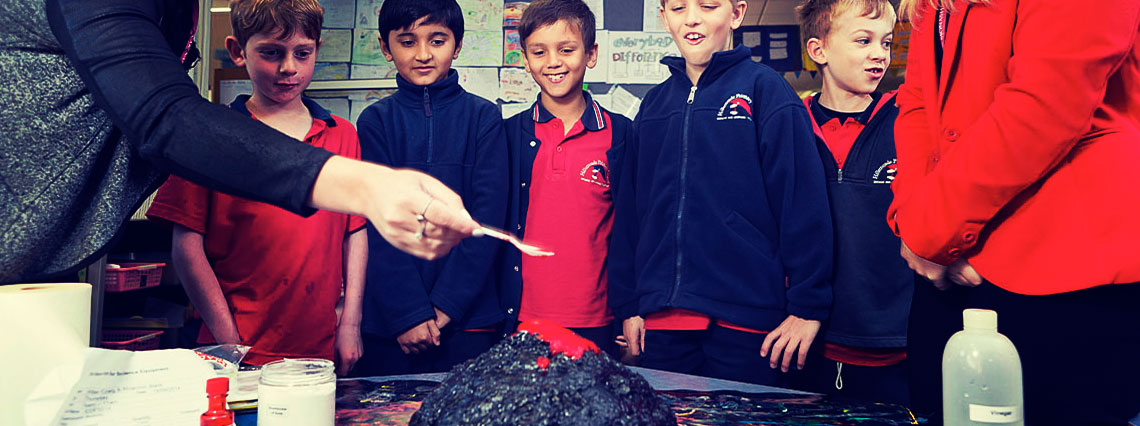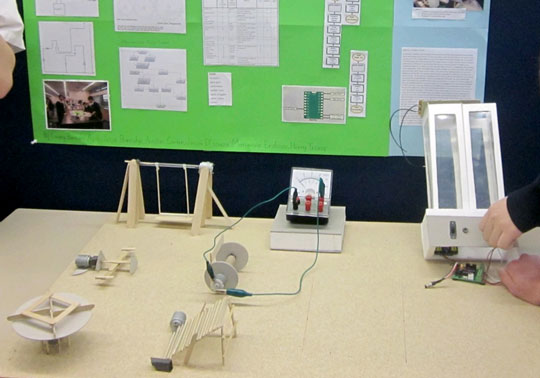
SCI3910 Schools Science project
A new science elective to be offered from Semester 2 2015

Why introduce this new unit?
SCI3910 has been designed primarily for undergraduate science students to develop and deliver teaching activities in schools.
It aims to:
- provide a genuine and safe workplace experience to undergraduate science students, through which they can reflect on and further develop skills required for employment: effective communication, problem solving, developing new innovative ideas, learning new skills, working in teams, leading and motivating small teams, thinking on their feet and coping with the pressures of working in a professional environment where 'conditions' are constantly changing; and
- provide undergraduate science students with an opportunity to communicate their passion for science to school students, through engaging activities they develop and lead.
What does it involve?
Students research, develop, manage and deliver (teach) a science based module that matches the learning outcomes specified to them by their client (supervising teacher).




Prior to their school placement, students participate in a series of workshops on:
- understanding and catering for different learning styles;
- motivation;
- team work;
- goal setting;
- planning;
- management;
- leadership;
- effective communication and presentation skills;
- asking the right questions; and
- reflection.
While there is an emphasis on how the students can directly apply this knowledge in the short term (during their school placements), they are also required to reflect how they will transfer this learning into their future workplace.
Unit learning outcomes
At the completion of this unit, students will be able to:
- Demonstrate they have identified and further developed the generic skills for the workplace: effective communication with a range of audiences, analyse and solve problems, develop new innovative ideas, learn new skills, effective teamwork, lead and motivate small teams, think on their feet and cope with the pressures of working in a professional environment where 'conditions' are constantly changing.
- Correctly interpret the brief from their client (supervising teacher). Research, design and deliver an individually tailored learning project that specifically meets the desired outcomes within the available scope.
- Appropriately manage: client expectations, schedules, resources, risk, personnel (school students') skill and knowledge levels, personal travel to and from site (allocated school), as well as their other commitments.
- 4. Assess their own understanding of the fundamental science principles relevant to a project. Design activities and explanations that will assist lay personnel (their students) to understand and accurately use these principles.
- Actively seek out and act upon constructive feedback.

How does the school placement work?
Students are placed into schools to design and deliver science modules that are individually tailored to meet their client's (supervising teacher's) needs. Schools provide an ideal hands-on, supportive, professional place of work for the students to step out of their comfort zones and develop their communication, problem-solving, organisation, leadership skills, etc. The school environment provides a 'natural' place of learning, where mistakes are reflected on and opportunities to improve are provided regularly.
The placement is an individual activity; its length varies depending on the project, but it is approximately 10 hours in total.
Students have an introductory meeting with the school supervisor to establish a teaching brief. They also observe a session of the class they will teach to familiarise themselves with the context and audience for their delivery. They then research, experiment, plan lessons and develop teaching materials. Finally they deliver the lessons and reflect on what worked/did not work and why, and consider what changes need to be made for future classes and how their learning can be transferred into a future workplace.
What does assessment involve?
Students keep a professional journal, documenting records of conversations and meetings, their own thinking, planning and research behind decision-making and evaluation of successful and unsuccessful outcomes. At the end of semester students prepare a written report that briefly describes their project and, perhaps more importantly, reflects on their learning and employability skills development and on the translation of this to a future workplace. They also make a group oral presentation to their peers focusing on the practical aspects of their school activity.
What is the workload like?
This is a 6 point unit, and so requires a workload similar to other 6 point units. Regarding contact hours, at the start of the semester there is a two-hour workshops to assess own skills and to prepare for the interaction with schools. The actual placement involves about 10 hours. Following the placement there are a couple of workshops to debrief.
Want to know more?
For further information contact: Dr David Overton david.overton@monash.edu
Footnotes:
Sign up to our mailing list to stay informed
